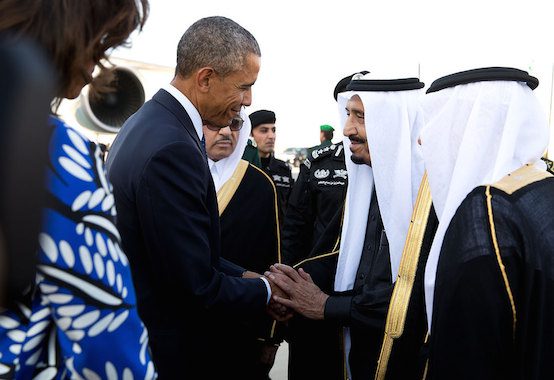Obama’s Misguided Indulgence of U.S. Client States
By •
Uri Friedman comments on Obama’s management of relationships with allies and clients:
By contrast, Obama seems to believe that the United States and its allies should—in an ideal world, at least—share interests and values. When an ally acts in ways he disapproves of, Obama has been more willing than his recent predecessors to publicly criticize or marginalize it.
There is some truth to this, but we should remember how shabbily Obama’s immediate predecessor treated many treaty allies and how empty most of Obama’s rhetorical jabs at some client states have been. When France and Germany resisted the U.S. over the invasion of Iraq, they were publicly rebuked by Bush administration officials far more harshly than anything we have heard from this administration about any ally or client, and France was singled out to be “punished” for having warned us against committing what proved to be one of the biggest foreign policy blunders in modern U.S. history. The Bush administration also annoyed many of its European allies with its silly missile defense scheme and its ill-advised push for bringing Ukraine and Georgia into NATO. The latter failed because France and Germany had the good sense to oppose it. Relations with many major European allies were in a parlous state for most of the Bush era as a result of the Iraq war rift and later disagreements, and they only really recovered after Bush left office. Relations with Turkey took a nosedive after they refused to participate in invading Iraq and didn’t allow the U.S. to use their territory to launch part of the invasion. That was when U.S.-Turkish relations really started to deteriorate. When it came to managing ties with actual allies, Bush was responsible for alienating more of them than anyone else in recent memory.
Obama has been a great one for chiding client states while simultaneously showering them in weapons and aid. Like his supposed “disdain of military force,” Obama’s willingness to “marginalize” some U.S. clients is mostly imaginary. Until the recent abstention on UNSCR 2334, the Obama administration had done much less to pressure Israel on settlements or anything else than previous administrations did, and at the same time it kept increasing the flow of weapons and aid for eight years. The story with the Saudis and the other Gulf states is much the same: some very mild, generic criticism combined with unprecedented levels of arms sales and completely uncritical backing of a reckless, atrocious war in Yemen. When the clients complain about the mild criticism, the Obama administration responds by giving them even more support, so one has to assume that some of the complaining is feigned in order to extract more benefits. As for Egypt, Obama did very little to protest the military coup and subsequent dictatorship despite the fact that he was obliged by U.S. law to suspend military aid. Once again, the client government bridled at the minor effort at protest, and then Obama yielded to try to placate them. Far from telling these governments “hard truths” and forcing them to face up to them, the Obama administration has mostly coddled and catered to these client states’ wishes, and it has failed to impose costs on those clients when they ignored the criticism and persisted in the behavior that prompted it. There has been a wide gap between what the U.S. says about its clients’ behavior and what it is actually prepared to do about it, and that is consistent with the rhetoric-action gap in Obama’s handling of other foreign policy issues. A couple belated, insignificant gestures at the very end of his second term don’t alter any of that.
The nuclear deal with Iran would seem to be the one big exception to all this, but that is somewhat misleading. In that case, Obama wasn’t stopped from pursuing the deal on account of the whining clients, but he nonetheless thought that he had to “reassure” them with more weapons and promises of support anyway. Even though Obama didn’t yield to their pressure to change our government’s behavior in that instance, he has gone out of his way to try to placate and indulge them even when they behave appallingly. If they aren’t satisfied with that level of indulgence, that is only because they assume they can get even more from the U.S. if they throw a fit and talk about how poorly Obama has treated them. Based on what we have heard from Trump, they are right to assume that.
Posted in foreign policy, politics. Tagged Iran, Barack Obama, Georgia, Israel, NATO, Turkey, George W. Bush, Germany, Ukraine, Saudi Arabia, France, Uri Friedman, UNSCR 2334.


0 Comments:
Post a Comment
Subscribe to Post Comments [Atom]
<< Home